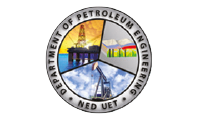Vision of Department of Petroleum Engineering
“To educate and prepare the students for exploitation of hydrocarbon resources of world in general and of Pakistan in particular, in the most technically, economically and environmentally viable manner”
Mission of Department of Petroleum Engineering
“To be recognized as a leading resource center in the region for providing best available tools and quality education and carrying out problem specific research in Petroleum Engineering Discipline through highly qualified faculty, use of up to date curriculum, state of the art laboratories and computing facilities”
Mission of Petroleum Engineering Programme
“To produce quality professionals equipped with problem solving skills, ethical values, health and safety standards and skills to petroleum engineering principles in order to serve the industry, academia and other R&D institutes”
Programme Educational Objectives (PEOs)
PEO-1: Exhibit comprehensive understanding of applied sciences integrated with core knowledge of Petroleum Engineering discipline using technological innovation.
PEO-2: Communicate and work efficiently to solve diverse engineering challenges.
PEO-3: Pursue successful professional practices considering inter-disciplinary prospects for the sustainable development of the environment and society.
PEO-4: Work independently as well as in multi-disciplinary teams proficiently with determination for life-long learning.
Programme Learning Outcomes (PLOs)
The graduates of Petroleum Engineering Department will demonstrate the following attributes for their professional career. .
- Engineering Knowledge: An ability to apply knowledge of mathematics, science, engineering fundamentals and an engineering specialization to the solution of complex engineering problems.
- Problem Analysis: An ability to identify, formulate, research literature, and analyze complex engineering problems reaching substantiated conclusions using first principles of mathematics, natural sciences and engineering sciences.
- Design/Development of Solutions: An ability to design solutions for complex engineering problems and design systems, components or processes that meet specified needs with appropriate consideration for public health and safety, cultural, societal, and environmental considerations
- Investigation: An ability to investigate complex engineering problems in a methodical way including literature survey, design and conduct of experiments, analysis and interpretation of experimental data, and synthesis of information to derive valid conclusions.
- Modern Tool Usage: An ability to create, select and apply appropriate techniques, resources, and modern engineering and IT tools, including prediction and modeling, to complex engineering activities, with an understanding of the limitations.
- The Engineer and Society: An ability to apply reasoning informed by contextual knowledge to assess societal, health, safety, legal and cultural issues and the responsibilities relevant to professional engineering practice and solution to complex engineering problems.
- Environment and Sustainability: An ability to understand the impact of professional engineering solutions in societal and environmental contexts and demonstrate knowledge of and need for sustainable development.
- Ethics: Apply ethical principles and commit to professional ethics and responsibilities and norms of engineering practice.
- Individual and Team Work: An ability to work effectively, as an individual or in a team, on multifaceted and /or multidisciplinary settings.
- Communication: An ability to communicate effectively, orally as well as in writing, on complex engineering activities with the engineering community and with society at large, such as being able to comprehend and write effective reports and design documentation, make effective presentations, and give and receive clear instructions.
- Project Management: An ability to demonstrate management skills and apply engineering principles to one‟s own work, as a member and/or leader in a team, to manage projects in a multidisciplinary environment.
- Lifelong Learning: An ability to recognize importance of, and pursue lifelong learning in the broader context of innovation and technological developments.
PEOs to PLOs Mapping - Graduate Attributes (GAs)
|
PLOs |
PEO-1 |
PEO-2 |
PEO-3 |
PEO-4 |
|
Engineering Knowledge |
x |
|||
|
Problem Analysis |
|
x | ||
|
Design / Development of Solutions |
x |
|||
|
Investigation |
x |
|||
|
Modern Tool Usage |
x |
|||
|
The Engineer and Society |
|
x | ||
|
Environment and Sustainability |
x |
|
||
|
Ethics |
x |
|
||
|
Individual and Team Work |
|
x | ||
|
Communication |
x |
|
||
|
Project Management |
x |
|||
|
Lifelong Learning |
|
x |
